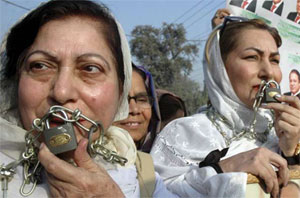 |
| Pakistani protesters hold locks and chains in front of their mouths to show solidarity with journalists who are facing media restrictions. (Associated Press) |
On November 3, Nova Scotians were bracing for Noel – a storm with strong currents and high winds. On the same day, Pakistanis were facing a different type of storm – a political one, much more lethal than Noel and likely to have long-term effects on their nation.
Pakistan’s President Pervez Musharraf, acting as a chief of army staff, decided on that day to impose a state of emergency throughout Pakistan, suspend the Constitution and reappoint members of the Supreme Court. At the same time he announced the present federal and provincial governments, both houses of parliament and the provincial assemblies were to be kept intact.
Mr. Musharraf’s move has been condemned inside and outside Pakistan. Opposition parties in Pakistan, lawyers, students, political activists and the media have criticized the president and have declared his move to be a second coup. Western powers such as United States, Canada and Britain along with the Secretary General of the United Nations, have demanded a lifting of the emergency and the creation of an environment conducive to democratic elections.
To understand the present situation in Pakistan and what it means to its citizens and the nation’s allies, let us focus on the background to this event. President Musharraf originally seized power on October 12, 1999 through a military coup and became de facto head of state. Later, in June 2001, he appointed himself president. Since then, the people of Pakistan have been summoned to the ballot box four times: twice for elections of local bodies, once for the referendum in April 2002 to extend Mr. Musharraf’s term as president for five years; and once in October 2002 to elect parliament through general elections.
And now the five-year term of parliament has come to an end. Elections were due to take place in January. Similarly, Mr. Musharraf’s own term of office as head of state and chief of army staff was set to end this month. As such, he was supposed to step down from his army post and contest for the post of president as a civilian.
However, in the wake of many court cases against the legality of his authority and due to his current unpopularity among the people of Pakistan, Mr. Musharraf decided to submit his nomination papers for the presidential elections without stepping down as chief of the armed forces. As expected, a majority of pro-Musharraf parliamentarians cast their votes in his favor, whereas the majority of opposition parties resigned from the parliament. In response, the Supreme Court asked the election commissioner not to declare the results of the presidential vote until the references filed against Mr. Musharraf were heard and decisions announced. It’s assumed by many that the court was waiting for November 15 to announce its verdict, marking the date when the general was supposed to step down from the post of chief of army staff and assume his new role as a civilian of Pakistan.
At this juncture, when hopes were so high that Pakistan would follow a democratic path, it is clear the country has suffered a major setback. Unfortunately, Pakistan has been thrown into uncertainty and regression by very drastic moves by the same man who was thought to be leading the nation towards a sustainable democracy.
The question arises: Why? For a few, this was a desperate and pre-emptive move by Mr. Musharraf to protect his position in advance of any judgment by the Supreme Court. Furthermore by replacing the judges, Mr. Musharraf has guaranteed a judgment in his favor.
For his part, Mr. Musharraf has enumerated several different reasons for enforcement of the emergency, including the rise in terrorist attacks and interference by the judiciary in government policy.
Primed to become a democracy, Pakistan has instead moved backwards. While it is true that neither the political parties nor the judicial system are strong enough to embrace fully the process of democratization, Mr. Musharraf’s elimination of the progress made towards democracy has brought despair to the nation and demoralized the people of Pakistan. The move toward complete democracy now looks insurmountable. In the eyes of her allies, the failure of Pakistan will strengthen the hands of fanaticism and may eventually place the country in the hands of those who may not agree with the philosophy of peace being encouraged by Western powers. However, if Pakistan resumes its march towards democracy — and one hopes and prays that it does — this will help in creating a peaceful, prosperous and harmonious South Asia and, perhaps, strike a timely blow against fanaticism and its sympathizers.
SEE: Court rules Musharraf can stay on as president in The Guardian
 | A native of Pakistan, Perwaiz Hayat teaches comparative religion classes in the Faculty of Arts and Social Sciences. |
